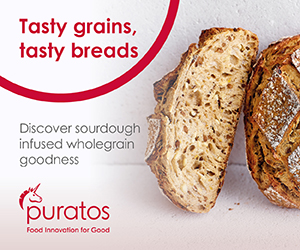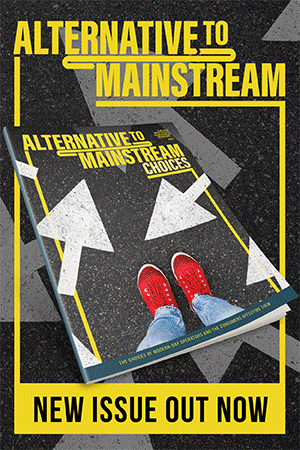PURATOS SOURDOUGH COLLABORATION WITH WILDFARMED
PURATOS UK LAUNCHES SAPORE SALLY, READY-TO-USE SOURDOUGH MADE WITH WILDFARMED REGENERATIVELY FARMED FLOUR
Puratos UK, a leading supplier of ingredients for bakery, patisserie and chocolate, has risen to the challenge of making sourdough more sustainable with the launch of the market’s first ready-to-use regeneratively-farmed solution.
The latest innovation in its Sapore range of living and inactive sourdoughs, Sapore Sally, is a living sourdough made with regeneratively farmed flour from UK-based Wildfarmed. It has been designed to help large bakeries to diversify their portfolios with locally-produced, sustainably-sourced sourdough products.
Sapore Sally has a creamy, slightly tangy taste and can be used to naturally enhance the flavour of a standard bread, or, when combined with a sourdough starter, adapts the flavour of a sourdough bread.
Puratos’s launch of Sapore Sally signals its first step in bringing locally-produced ingredients, made with regeneratively farmed flour, to UK bakers. It comes in the context of Britons becoming increasingly conscious about their food choices: 71% think that food made with local ingredients has a positive impact on the environment, according to the latest Taste Tomorrow research.
Philippa Knight, Marketing Director at Puratos UK, said: “Sourdough and natural fermentation is a passion at Puratos, and continues to grow in popularity among consumers. As part of our commitment to continuous innovation and responsible sourcing, we’re developing our successful Sapore range to cater to the evolving needs and values of conscious consumers - sustainability, naturalness and health. Our proprietary Taste Tomorrow research found that 68% of UK consumers now seek out food that has been produced sustainably and nearly three in five (58%) want to be informed about where their food comes from.”
“With Sapore Sally, we deliver on this hunger for knowledge and thirst for transparency, offering natural, locally- and sustainably-produced ingredients. We are delighted to collaborate with Wildfarmed on creating this truly transformative solution, bringing nature to the forefront of the baking industry and making sourdough manufactured with regeneratively farmed flour far more accessible.”
Wildfarmed works with over 100 farmers across the UK and France who embrace regenerative approaches to improve farm biodiversity and soil condition. All Wildfarmed crops are grown without the use of pesticides, and growers, who all are independently audited, must adhere to a robust set of the Wildfarmed Regenerative Standards.
This sustainable farming method means that ecosystems are restored and protected, and soil is revitalised and renourished. This ensures that its ability to produce food in the future is not diminished. In addition, research has suggested that regenerative farming could reduce UK agricultural emissions by up to 38%.1
Rachel Stonehouse, Wildfarmed’s NPD Manager, commented, “The launch of Sapore Sally with Puratos provides bakers with a further way to incorporate Wildfarmed regenerative flour into their recipes, contributing towards our mission of ensuring landscapes across the UK become full of life once again. Plus, by adding Wildfarmed flour to a product as part of this alive, slow fermented sourdough, it allows the complex and unique flavours and aromas of Wildfarmed flour to really shine through - resulting in products that taste better and are better for you and the planet.”
As well as working with Wildfarmed in the UK, Puratos is also developing products made with regeneratively farmed flour in Belgium, Italy, and Australia.
“At Puratos, we believe that the future of bread lies in the past,” added Philippa. “Consumer demand for traditional ingredients like sourdough shows no sign of slowing down, and the craving for natural, healthy breads is palpable. But we also need to look to the future and how we can lessen the impact that food production has on the environment. Sapore Sally is one such solution, acting as a springboard for more responsibly-manufactured bakery products and offering customers and consumers ‘seed to sourdough’ transparency.”



